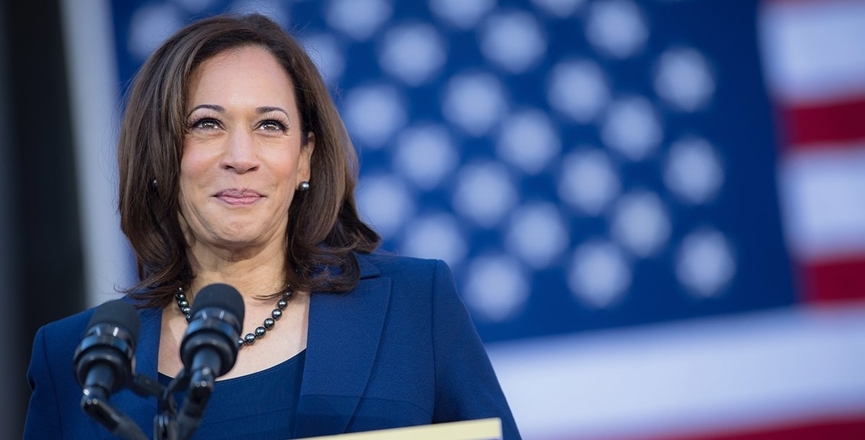Debate evaluations rarely include scores for “putting up with rudeness.” This being 2020, however, the debate between the incumbent Republican president and challenger former vice-president Joe Biden spurred calls for new rules — as well as new memes.
President Trump talked constantly during Biden’s turns to speak, despite the moderator telling him to stop. Finally, Biden snapped, “Aww, will you shut up, man?” His plea became a meme the next day. Soon it was joined by photos of embroidery hoops with flowers stitched around the phrase, “I’m speaking.”
At the vice-presidential debate, COVID protocols kept candidates Kamala Harris and Mike Pence 3.5 metres apart, with plexiglass screens between them. Pence tried to assert masculine authority by talking over Harris. It didn’t work.
Harris responded at once to his interruptions. “I’m speaking,” she said. She was smiling and nodding, expecting co-operation. She didn’t even emphasize the “I.” She remained unperturbed by Pence’s insults and crosstalk. NBC found that he interrupted her nearly twice as often as she interrupted him.
The ruder and more mendacious Pence became, the more Harris smiled. Nothing he said rattled her. When he absolutely insisted on talking over her, she stopped, smiled, and waited until he ran out of steam. “Are you done now?” she asked, nodding, and smiling some more.
The Guardian’s David Smith noted “Kamala Harris’s ability to weaponise facial expressions.” He wrote: “The California senator’s fusillade of raised eyebrows, pursed lips and withering stares at her opponent will live in Democrats’ memory long after the words are forgotten.”
BBC reported on a Republican focus group that found “Harris’ reactions to Pence — the smiling, the smirking, the scowling,” left them far “angrier” than his interruptions of her. Even so, FiveThirtyEight found that Harris won among debate watchers: 69 per cent said her performance was good or better, compared to 60 per cent for Pence. On policies, she won 61 per cent to 44 per cent.
How could she keep smiling? Was it her experience as a prosecutor, as California’s attorney-general, as a senator that gave her such steely resolve? Probably all of the above, plus the gender factor. Women in politics can’t afford to look angry on TV, or raise their voices. As anyone who’s ever worn that encouraging smile will recognize, Harris beamed at Pence the way a grandmother beams at a cranky toddler — a fitting response to someone who calls his wife, “mother.”
Speaker of the House Nancy Pelosi has handled the president in the same way, humouring him, deflecting him, talking over his head. As Patricia Murphy wrote in Rollcall Magazine, when the president stormed out of a West Wing meeting with Democrats, Pelosi’s response was, “I’m a mother of five, grandmother of nine. I know a temper tantrum when I see one.”
“Patting her opponents on the head has in fact been one of Pelosi’s most reliable and effective tools as she has risen to power,” Murphy concludes. While Harris didn’t exactly pat Mike Pence on the head (is that what the fly was doing?) she seemed quite capable of sending him to his room.
Harris has another reason to smile, a valuable resource hidden in plain sight. She is the first graduate of a historically Black college or university to be nominated for such a high public position.
As a member of the Alpha Kappa Alpha sorority, Harris is “sister” to 300,000 professional African-American women across the U.S. who are active in their communities. In turn, AKA is part of the “divine nine” — the nine African-American sororities and fraternities that regard themselves as a family, and that devote themselves to fundraising and community service.
Naturally enough, these vigorous national networks are immensely proud of Harris, and eager to see her succeed. “While Alpha Kappa Alpha does not endorse political candidates,” AKA announced in a news release, “we cannot overlook or overstate the significance of this historical moment for our sisterhood and for Historically Black Colleges and Universities. Indeed, this moment is long overdue.”
In particular, Alpha Kappa Alpha pledged to continue their practice of getting out the African-American vote — which is high priority for Democrats. Help from AKA and other community organizations will be crucial now that half the states have reinstated voter suppression rules, and the president is urging his supporters to “watch” the polls in groups.
Meanwhile, AKA and the divine nine can always fundraise. “Philanthropy in Black fraternities and sororities [is] often focussed on increasing Blacks’ participation in education, engagement in political processes, stimulating entrepreneurial ambitions, and establishing a tradition of giving through fraternity-based foundations,” says the Philadelphia philanthropy website, Generocity.
The New York Times reported that Joe Biden raised more than US$50 million in 48 hours after he named Senator Kamala Harris as his running mate, which, the Times noted was, “an enormous outpouring of donations.”
Finally, let’s not overlook the obvious. Kamala Harris smiled because, as the first Black vice-presidential candidate, she is breaking a barrier. As an ambitious woman in mid-life, she has an opportunity to show what she can do. As Biden’s running mate, she can call Barack and Michelle Obama her mentors. She is stepping onto the world stage.
Award-winning author and journalist Penney Kome has published six non-fiction books and hundreds of periodical articles, as well as writing a national column for 12 years and a local column in Calgary for four years. She was editor of Straightgoods.com from 2004-2013.
Image: Kamala Harris/Facebook




